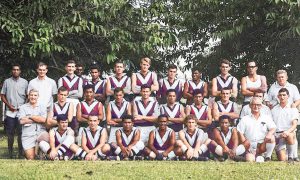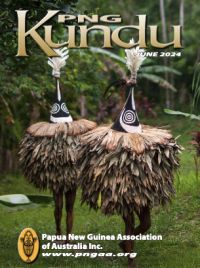Part-Time Journalist in Rabaul
Michael White
I arrived in Rabaul on Christmas Eve 1967, a newly-minted adult at 21, to take up a position as Station Clerk, Rabaul Police Station. I had spent the previous two and a half years as the District Agricultural Clerk in Wewak, where I had first arrived in 1965. Whilst there I had helped establish a new Aussie Rules competition, where I had my first journalist experience, having my article on a match between the visiting HMAS Anzac (II) and a combined Wewak side, published in the Post-Courier.
I was a natural for exploitation, and Graham Bowden and Henry Bodman from Maltech, and John Waters from Radio Bilong Yumi, wasted no time roping me in to be secretary of the local football league. With such a strong force in the town, and with the newly-established training facility at Tomaringa, the police were an obvious source of personnel for an additional team, and so the Police Aussie Rules teams came into existence, fully kitted out by the Royal Papua New Guinea Constabulary (RPNGC).
In the off season, cricket was the game of choice, and it was only natural that a police team was formed and entered into the local competition. Around this time, I met with Ron Antoine, a ‘chalkie’ who ran a twice-weekly sports program on the local ABC station – Radio Rabaul.
Ron asked if I would help him out, collecting and giving the cricket scores each Monday night, and the itinerary with some forecasts of the weekend’s games, on the Friday evening. We continued this relationship through the following football season and then added a general sports show on Wednesday evenings filled with interviews and reporting of sporting events around the world.
We were approached by the manager of the RSL Club, a Mr Dougherty I think his name was, to record and/or broadcast a boxing tournament he was organising. We had never done an outside broadcast before and our collective knowledge of boxing was minimal, at best. But we agreed and arranged to record the preliminary bouts and broadcast direct the main event on the card held over three two-minute rounds.

Papua Australian Rules Team in the 1967 Football Carnival in Rabaul between Papua, New Guinea and the New Guinea Islands
We never imagined how difficult it is to record six minutes of two guys punching each other in the head, without repeating yourself incessantly. Needless to say, it was not a roaring success, and we were never asked to relay the bout, or play any of the supporting bouts we had recorded but not broadcast.
Not long after this Ron retired from broadcasting—I think he was transferred—and I was asked, as a ‘seasoned reporter’, to take over his role. Being almost 23 at the time, I was pretty chuffed at the invitation and continued the programs for about two years.
It was later that year that the New Britain Open came to town. I knew as much about golf as I knew about boxing but, undaunted, I approached the Rabaul Golf Club, suggesting that, as there were so many professional golfers coming to town, it might be a good opportunity to tap into their knowledge of the game, to assist our listeners. It was agreed that each visiting professional would give a three-minute talk on his club of choice and how to use it.
I took my trusty tape recorder down to the golf club each afternoon of the tournament and recorded ten segments. I cannot remember who all the pros were, although I seem to recall Stuart Ginn being one, very early in his career. The segments were very popular and we played one each Wednesday night on repeat. I believe they were also broadcast on the ABC in Port Moresby.
In the footy season I would often be seen at the Aussie Rules games, in my folding chair with my portable typewriter on my knees, getting my copy done of the match for publication in the Post-Courier the next week, and as an aide-mémoire for Monday’s broadcast. The pinnacle of my broadcasting career occurred when in 1970 we decided that it would be a good idea to broadcast the Aussie Rules Grand Final match, I think between West New Britain and the Matupit Eagles on Queen Elizabeth Oval, with the commentary both in English and Pidgin.
We set up on the halfway line on the back of a ute, with two mikes for the broadcast and a field telephone connection back to the station for any communication between them and us. What could possibly go wrong!
All went swimmingly with my co-presenter doing the Pidgin commentary and me doing the English portion. At the breaks we telephoned the station, who would fill in the time until we called to say the game had recommenced. With just a few minutes to go and the game very evenly poised, down near the WNB goal all hell broke loose with, what we later discovered, was a very dubious call by the goal umpire. With both teams and most of the spectators now involved, we tried to call the station to switch back, but the line was dead, and so we dispatched one of the tech assistants to run back to the studio to get the broadcast cut.
The game was abandoned but we continued to broadcast. I have to admit describing a riot presented a lot more opportunities than a bout of boxing. We continued until we got word that the broadcast had been cut, by which time things had started to settle down. Quite a day – quite an experience.
On the Monday evening when I turned up for my show, I found a telegram addressed to me on the desk. It read something like: ‘Congratulations. Loved the broadcast, particularly the last 5 minutes.’ I cannot recall the sender’s name but I will always remember that it was sent from Port Hedland, Western Australia, where the sender had been listening to our shortwave transmission.
My crowning glory. An international broadcaster! Shortly after this I met a girl who was to become my wife, and my focus shifted. Shortly after my 24th birthday, I retired from broadcasting and other journalistic pursuits. It was a fun time indeed.
Editor’s Note: If Michael’s story has prompted some of your long-held memories, please jot them down and send them to editor@pngaa.net.



